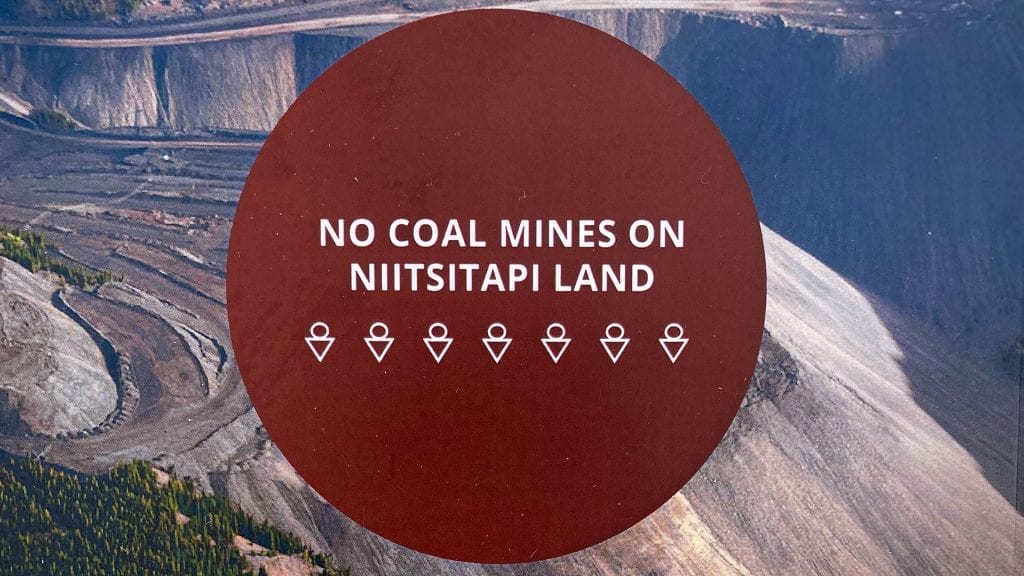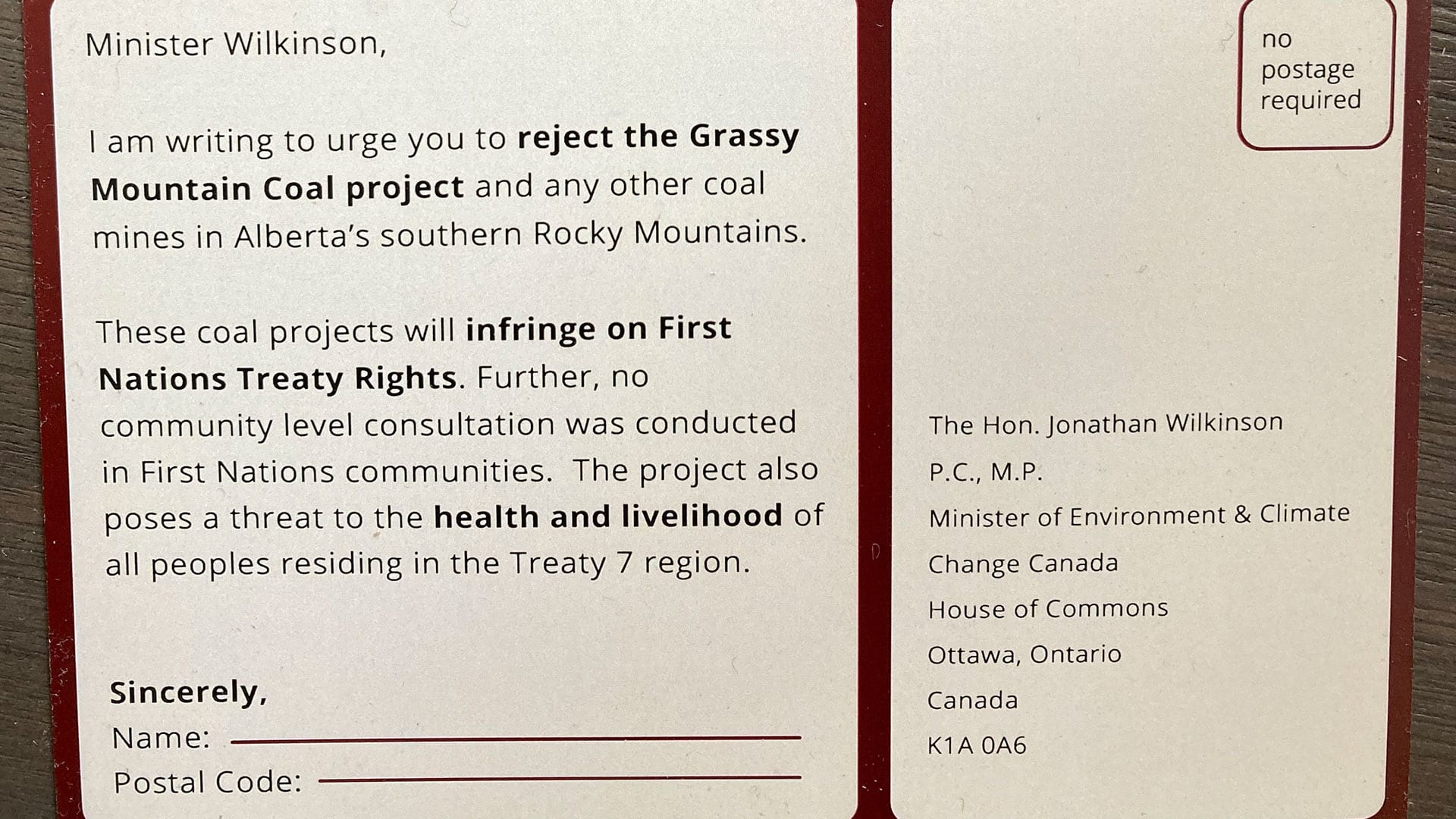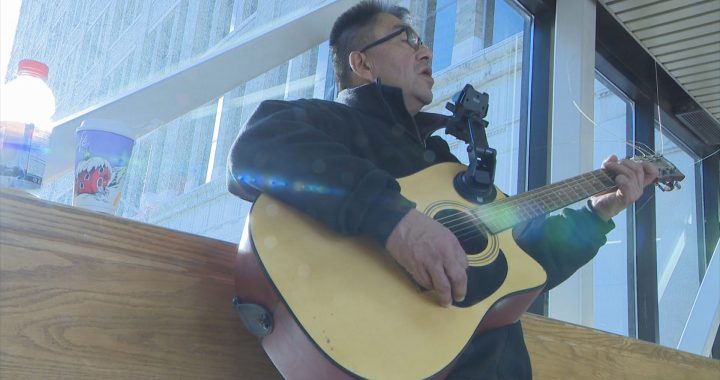
Members of the Blood Tribe in southern Alberta have sent more than 700 postcards to the federal environment minister so far. Facebook
Alberta has decided to cancel recently issued coal leases in the Rocky Mountains, as public opposition grows to the United Conservative government’s plan to expand coal mining in the area.
Earlier this week, Energy Minister Sonya Savage issued a press release saying the sale of 11 recently purchased coal leases would be cancelled. Savage added that no further leases would be sold on lands that were protected from open-pit mines under a policy the government revoked last May.
“We have listened carefully to the concerns raised in recent days, and thank those who spoke up with passion,” she said in the release.
“This pause will provide our government with the opportunity to ensure that the interests of Albertans, as owners of mineral resources, are protected.”
She also said the move will have no impact on existing coal projects currently under regulatory review, which includes the controversial Grassy Mountain Coal Project.
The cancelled leases are a small portion of the coal exploration leases the government has issued since revoking a policy that protected the eastern slopes of the Rockies – home to endangered species as well as the water source for millions downstream – since 1976.
The decision came as more than 100,000 signatures had been collected on two petitions opposing increased mining on two related fronts.
One, sponsored by environmental groups on Change.org, was addressed to the provincial government and had 77,000 signatures Monday afternoon – an increase of about 10,000 over the weekend.

Another, sponsored by a private citizen and addressed to federal Environment Minister Jonathan Wilkinson, had nearly 28,000 names opposing the Grassy Mountain Coal Project by Benga in southern Alberta, which is undergoing a federal-provincial environmental review.
Members of the Blood Tribe or Kainai First Nation in southern Alberta have sent more than 700 postcards to Wilkinson asking him to block coal development in the Rockies and another 2,000 have joined an online group to that end, said organizer Latasha Calf Robe.
As well, a Facebook site called Protect Alberta’s Rockies and Headwaters has more than doubled its membership over the last week to more than 10,000. The Benga review has received more than 4,000 statements of concern from members of the public, the vast majority opposing the project.
Neither Savage nor Alberta Energy staff were available to take questions on the issue, The Canadian Press reported.
“The government is obviously feeling the pressure,” said Katie Morrison of the Canadian Parks and Wilderness Society.
She pointed out the announcement doesn’t affect coal leases covering 420,000 hectares the government has sold since cancelling the coal policy.
“What can still go forward is massive,” she added.
Before the cancellations, at least eight provincial recreation areas would have been mostly or completely surrounded by coal exploration leases. It wasn’t immediately clear how they are affected by the move.
READ MORE:
Proposed coal mine will ‘decapitate’ Grassy Mountain in southern Alberta: AWA
Meanwhile, an Alberta government lawyer says decisions about environmental policy should be made by elected officials, not the courts.
Melissa Burkett, speaking at a court hearing in Calgary this week opposing a judicial review of revoking the policy, said the move was entirely within the responsibility of Savage.
Burkett said when the policy was first adopted in 1976 it anticipated a thorough regulatory process, which now exists in the province.
Savage revoked the policy last May without any public consultation, which area First Nations and ranchers said violated laws that have incorporated its guidelines.
“This case is not about an unlawful exercise of government power,” Burkett argued.
“This case is about the government’s ability to create and dictate policy based on economic, social, political and other relevant factors.”
Allowing a review would wrongly tie governments to the decisions of their predecessors, she added.
Burkett said the policy had become obsolete given the development of Alberta’s energy review bodies and laws. Overturning the policy has “no practical impact” because agencies such as the Alberta Energy Regulator now exist, she said.
The review
And because those oversights now exist, revoking the policy hasn’t violated the rights of those seeking the review, Burkett said.
Her colleague, Andrea Simmonds, disputed the ranchers’ arguments that requirements for public consultation exist in land-use law and in regional plans.
She said the Alberta Land Stewardship Act doesn’t allow for judicial review of decisions made under its purview. Regional plans “have no legal status,” she said.
On Tuesday, First Nations and ranchers who filed separate requests for the review agreed to have their arguments heard together.
The Bearspaw, Kainai, Siksika, Ermineskin and Goodfish Lake First Nations kept the right to bring separate constitutional arguments, which are not part of the application filed by rancher Macleay Blades.










